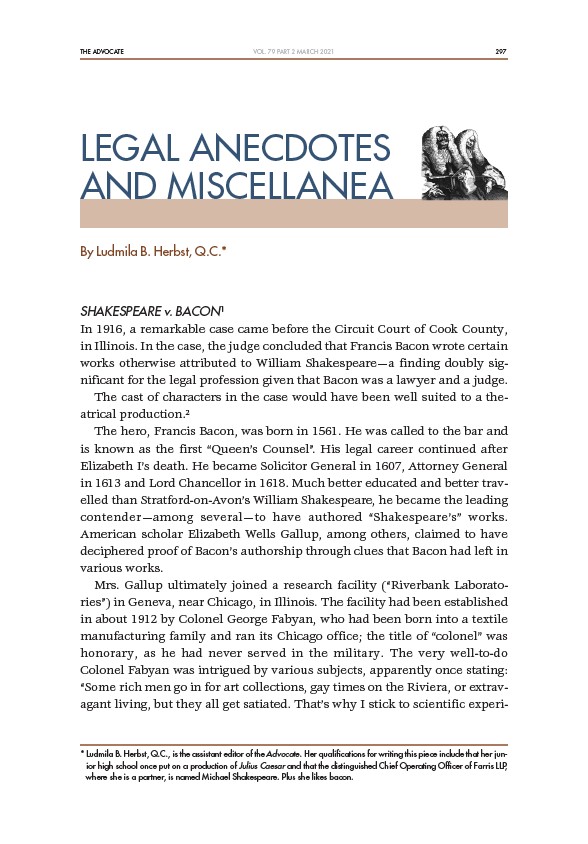
THE ADVOCATE 297
VOL. 79 PART 2 MARCH 2021
LEGAL ANECDOTES
AND MISCELLANEA
By Ludmila B. Herbst, Q.C.*
SHAKESPEARE v. BACON1
In 1916, a remarkable case came before the Circuit Court of Cook County,
in Illinois. In the case, the judge concluded that Francis Bacon wrote certain
works otherwise attributed to William Shakespeare—a finding doubly significant
for the legal profession given that Bacon was a lawyer and a judge.
The cast of characters in the case would have been well suited to a theatrical
production.2
The hero, Francis Bacon, was born in 1561. He was called to the bar and
is known as the first “Queen’s Counsel”. His legal career continued after
Elizabeth I’s death. He became Solicitor General in 1607, Attorney General
in 1613 and Lord Chancellor in 1618. Much better educated and better travelled
than Stratford-on-Avon’s William Shakespeare, he became the leading
contender—among several—to have authored “Shakespeare’s” works.
American scholar Elizabeth Wells Gallup, among others, claimed to have
deciphered proof of Bacon’s authorship through clues that Bacon had left in
various works.
Mrs. Gallup ultimately joined a research facility (“Riverbank Laboratories”)
in Geneva, near Chicago, in Illinois. The facility had been established
in about 1912 by Colonel George Fabyan, who had been born into a textile
manufacturing family and ran its Chicago office; the title of “colonel” was
honorary, as he had never served in the military. The very well-to-do
Colonel Fabyan was intrigued by various subjects, apparently once stating:
“Some rich men go in for art collections, gay times on the Riviera, or extravagant
living, but they all get satiated. That’s why I stick to scientific experi-
* Ludmila B. Herbst, Q.C., is the assistant editor of the Advocate. Her qualifications for writing this piece include that her junior
high school once put on a production of Julius Caesar and that the distinguished Chief Operating Officer of Farris LLP,
where she is a partner, is named Michael Shakespeare. Plus she likes bacon.